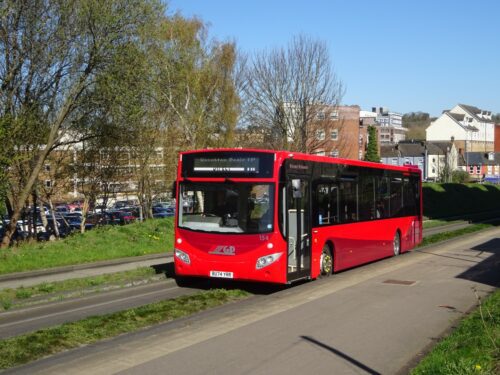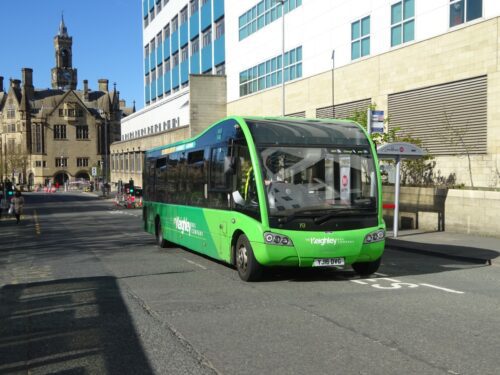
As the Government’s Bus Services Bill reached its Second Reading in the House of Commons on 2 June, the Transport Secretary called for greater accountability and reliability for bus services. MPs have also begun to have their say on the Bill, which contains proposals to protect services and empower local authorities to make the decisions that will benefit their communities. The Government says that the Bill, which has already passed through the House of Lords, will improve access to opportunities that drive up living standards and so grow the economy, as part of its Plan for Change.
MPs also debated how the Bill will allow local authorities to emulate the success of locally controlled bus networks. To mark the milestone, the Local Transport Minister Simon Lightwood visited Blackpool to hear first hand from passengers how the locally-controlled Blackpool Transport’s buses have put their needs first to deliver services that allow them to access jobs and social opportunities that drive up their quality of life.
Transport Secretary Heidi Alexander said: “We’re committed to giving local leaders the power to shape the bus services their communities rely on. Our Bus Services Bill is a big step forward, protecting vital services that people depend on to get to work, school, or essential appointments. We have taken a decisive step towards better buses, building on our £1 billion investment to improve and maintain bus services, keeping people connected, driving up living standards and growing the economy in line with our Plan for Change.”
The plans will lift the ban on local authorities establishing their own bus companies, which the Government says will make it easier for them to control services and shape routes. The Government also promises to reduce some of the complexities and red tape involved in bus franchising, including reducing the minimum time period between initiation of the process and the start of services.
The Bill will also empower local authorities to work alongside private operators to improve bus services if they choose to not pursue full ownership, and aims to improve safety for both passengers and staff by mandating that staff, including drivers, undertake training to recognise and respond to incidents of criminal and anti-social behaviour, including acts of violence against women and girls.

Stakeholder response
Mayor of Greater Manchester Andy Burnham said: “De-regulation of buses came at the expense of passengers, with a shrinking network, high fares and a service not fit for the rapid growth and scale of ambition we are seeing in Greater Manchester. As the first area to bring buses back under local control, our Bee Network is putting people and businesses before profit, reversing decades-long decline in buses with rapidly growing numbers of passengers served by a more reliable, affordable and integrated network. This is central to supporting economic growth, higher productivity, access to new jobs, homes and public services and opening up opportunity for all.
“This Bill is vital to reforming transport networks across the country, putting power back in the hands of locally accountable leaders to ensure services work for the communities they serve.” North East Mayor Kim McGuinness added: “On my first day as Mayor, I started the legal process to bring buses back under public control because good public transport is how we unlock growth and opportunity for local people.
I hear every day from people fed up with poor bus services. This can’t go on, so I’m pleased the Government is working with Mayors and local authorities to bring in legislation that will support our effort to improve bus networks across the country. It is crucial we fix the broken bus market so we can provide the reliable, affordable public transport people need.” Professor Karen Lucas, Director of Manchester Urban Institute, commented: “The new Buses Bill will finally put a halt to the decimation of socially necessary services after years of unregulated cuts that have left many vulnerable people and low-income and rural communities stranded. This is a good first step in the right direction, but more local action is needed,” whilst Bus Users UK Director for England Lydia Horbury added: “The protection of socially necessary bus services is vital to ensuring that everyone, regardless of age, income, or ability, can access education, employment, healthcare and their wider community. For too long, communities have been left stranded by sudden cuts to lifeline routes.
“Strengthening the framework around these services, as proposed in the Bus Services Bill, is a crucial step toward building a truly inclusive and reliable transport network outside London. We support any measures which empower local authorities to safeguard these routes and the passengers who depend on them.”
Chief Executive of the Confederation of Passenger Transport Graham Vidler shared his thoughts: “Bus travel in England grew by 15% last year, the fastest rate for half a century, demonstrating healthy demand for journeys up and down the country. The second reading of the Bus Services Bill today is a welcome step forward in prioritising Britain’s favourite mode of public transport. Bus operators share the Government’s goal of delivering frequent, reliable and affordable services. To be truly ambitious in meeting demand, the Bus Services Bill needs to be matched with funding not just to preserve the existing network but to add additional bus routes.
“Extra funding of £205 million a year in the Treasury’s upcoming Spending Review would be sufficient to build the bus network by 5%, enough to add 36 million miles of bus travel annually. That would be a modest sum in the context of the Department for Transport’s annual budget of £40 billion. And the quickest, easiest way of improving buses would be to encourage local authorities to speed up journeys by investing in bus lanes and priority schemes.”

